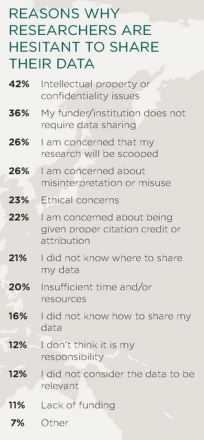Here is a summary of the week I spent trawling the internet finding out about Data Sharing as a researcher and what it means to share your data.
The Data Sharing Week for me actually started a week earlier when I was asked to write a Guest Blog for Digital Science about Why Scientists Should Share Their Data. So please read my piece on why it benefits to share and read on here to discover more about sharing research data.
MOZILLA SCIENCE: The blog I wrote was picked up by Mozilla Science Lab who did their own review of open science in the week March16-22. And I was pleased they did because Mozilla Science Lab is an interesting company helping a global network of researchers, tool developers, librarians and publishers collaborate to further science on the web. They even have a fellowship to allow researchers to spend ten months working on ‘open’ research.
WHY SO HESITANT?: A November 2014 Blog from Wiley’s, Liz Ferguson (Director of Publishing Solutions) Presents the results of a survey of 2.25K researchers views on data sharing. Clinical research was one of the areas in which most concerns were met about sharing data openly, and it’s interesting to see the infographic of results summaries:
The 25th February 2015 sees a timely PLOS|ONE article, ‘What Drives Academic Data Sharing‘, from German Authors (Germans appear to share the most open data according to Wiley’s infographic) and ironically least likely according to another article (2012). In this latest article the authors discuss how they’ve developed a conceptual framework that explains the process of data sharing from the primary researcher’s point of view and divide them into six descriptive categories. In conclusion they state the accessibility of data holds great potential for progress and allows verification of study results and use of data within new contexts. To drive sharing forward in research they have shown in their paper that sharing data is multidimensional effort not driven by any one set of stakeholders with no recognised overarching framework, but their conceptualisation is useful to observe current motivational drivers.
They review their own work in their own blog piece stating that ‘Academia is a reputation economy‘.
I found a lovely short blog piece by Christine L Borgman, University of California, Los Angeles (March 2015) highlighting the problems we face in curating the masses of research data we are producing for researchers, stakeholders, librarians, policy-makers, publishers, students etc…
WE HAVE INCENTIVES TO SHARE:
If you laughed at that video it’s only because you know you’ve been in that situation before and realise that things should be made easier.
Jon Tennant, a regular contributor to the open data and access debate shares in his guest blog with Digital Science (home to great open access resources like Figshare). Jon tells us his clear message that we need to face facts and realise the future, which is sharing data.
RESEARCHGATE: Bite blog: How do Scientists Share on Academic Social Networks like ResearchGate (March 2015), discovered that RG launched a new feature in March 2014, Open Reviews – to openly peer review each others’ papers AFTER publication, but apparently no-one is really using it. I found this particularly interesting but the whole blog is worth a read.
The other popular academic social community, ACADEMIA.EDU, have a group Discussing Research Data Sharing Through Open Access (‘Acces’) and Enhanced Publications, with some useful resources to papers about Data sharing, even to writing papers.
GETTING CREDIT WHERE CREDIT’S DUE: One of the things stopping most people from sharing data is getting credit for the data. Luckily we can attribute data to authors, and through things like DOI and ORCID where your research and data can be recognised via unique digital identifiers.
Furthering on from this, collaboration has occurred between Digital Science and The Wellcome Trust to develop the foundation for a new system to attribute researcher effort via something called CRediT Taxonomy (facilitated by the impressive CASRAI and NISO systems. This is exciting since it will hopefully become easier to share what you are doing more easily, as well as see who is doing what, and attribute that information to your research data and curation.
OPEN PHD AND THESIS: This is an absolutely fascinating find. A current PhD candidate and early career researcher looking at ‘How Knowledge is Created (Produced, Distributed and Consumed); how we as Scholars are Involved in Knowledge Creation; and at how we can create alternatives to the present system, focussing on things including the function of the academic author. This work includes experiments that engage with open access publishing and peer review, and the thesis is written in an alternative digital and open way on the wordpress blog, ‘open reflections‘. You can read parts of the thesis already!
SIGN ME UP, WHERE DO I SHARE?: If you still don’t know where to share data and code, we couldn’t be luckier since Connected Researchers, Thomas Crouzier, has made a great list. Not only has it this list but a whole plethora of resources for reference managers, search engines for scholarly papers, and useful lab software. It’s a Superb website! Follow him on Twitter via @ThomasCrouzier
Next week I will be summarising all I have learned about helping academics stay on top of their research lives in Getting Things Done and Organisation!

Food Science and Microbiology Android Apps !
Visit our shop on Google Play to get new apps today!
https://play.google.com/store/apps/developer?id=Research+Lab+Tools
Visit our blogger
http://researchlabtools.blogspot.com.br/
Find us on Facebook!
http://www.facebook.com/researchlabtools
LikeLike